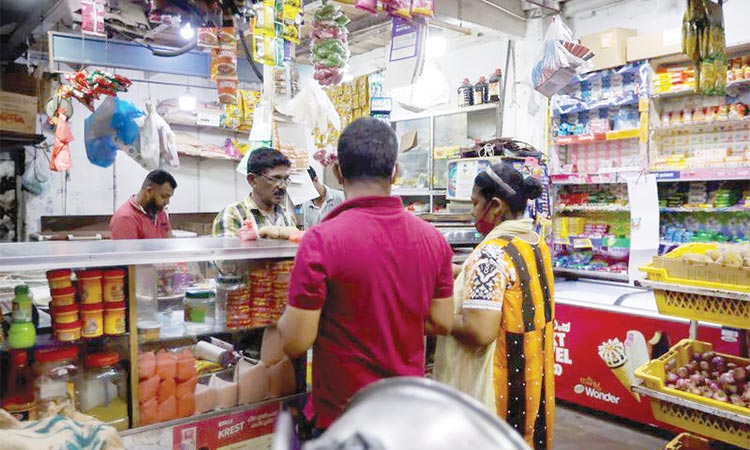Pakistan inflation slows to 17.3% in April, lowest in nearly 2 years

Men sell vegetables at their makeshift stalls at the Empress Market in Karachi, Pakistan. Reuters
Pakistan has been beset by inflation above 20 per cent since May 2022. Inflation jumped as high as 38 per cent in May 2023, as the country navigated reforms as part of an International Monetary Fund (IMF) bailout programme.
Month-on-month inflation fell 0.4 per cent, dipping into negative territory for the first time since June 2023.
In its monthly economic report, Pakistan’s finance ministry said it expected inflation to hover between 18.5 per cent and 19.5 per cent in April and ease in May to 17.5 per cent-18.5 per cent.
“The inflation trajectory is slowing primarily on account of food inflation which has slowed down considerably,” said Faizan Kamran, CEO of FRIM Ventures, a Karachi-based investment and research company.
Kamran added that he expects inflation to fall into single digits in the next five to six months.
Pakistan’s central bank kept its key interest rate unchanged at 22 per cent on Monday, hours before the IMF executive board approved $1.1 billion in funding under a $3 billion standby arrangement signed last year. An IMF statement following Monday’s approval by the board said that inflation, while still elevated, continues to decline, and, with appropriately tight, data-driven monetary policy maintained, is expected to reach around 20 percent by end-June.
The bank’s monetary policy committee said it was “prudent” to continue with its monetary policy stance to bring inflation down to the target range. It has left the rate unchanged for seven straight policy meetings.
Antoinette Sayeh, Deputy Managing Director and Chair at the IMF, said Pakistan’s central bank’s tight monetary policy stance remains appropriate until inflation returns to more moderate levels.
Pakistan plans to approach the IMF again for a longer-term programme by early July. The country completed its nine month standby arrangement earlier this week.
Meanwhile Pakistan’s central bank kept its key interest rate unchanged at 22 per cent for the seventh straight policy meeting on April 29, hours before the International Monetary Fund executive board meets to discuss the approval of $1.1 billion in funding for Pakistan. Battling inflation and limited foreign exchange reserves, the cash-strapped South Asian nation is trying to navigate a path to economic recovery under a $3 billion standby arrangement with the IMF secured last summer to avert a sovereign default, and is hoping to sign a longer term programme.
The bank’s monetary policy committee said in a statement that it was “prudent” to continue with its monetary policy stance at this stage to bring inflation down to the target range of 5 per cent-7 per cent by September 2025.
It added that it expected inflation to remain on a downward trajectory, but that recent oil price volatility poses a risk to the outlook. Consumers’ inflation expectations also edged up in April.
“In spite of the positive real interest rate, (the) Pakistan Central Bank rightly kept rates unchanged,” said Mohammed Sohail, chief executive at Topline Securities Ltd.
“This is mainly due to the risk of inflation remaining high in coming months due to higher global commodity prices and budgetary measures that may increase local prices,” he said.
Pakistan’s key rate was last raised in June to fight persistent inflation and to meet one of the conditions set by the IMF for securing the bailout. Reforms under the programme have complicated the task of keeping price pressures in check.
Inflation has slowed, however that has been primarily due to a high base effect.
Pakistan’s consumer price index (CPI) for March was up 20.7 per cent from the same month last year, the lowest reading in nearly two years and below the finance ministry’s projections for the month.
The executive board of the International Monetary Fund approved $1.1 billion in funding for Pakistan last Monday, the agency said in a statement, amid discussions for a new loan.
The funding is the second and last tranche of a $3 billion standby arrangement with the IMF, which Islamabad secured last summer to help avert a sovereign default.
The approval came a day after Pakistan Prime Minister Shehbaz Sharif discussed a new loan programme with IMF Managing Director Kristalina Georgieva on the sidelines of the World Economic Forum in Riyadh.
Islamabad is seeking a new, larger long-term Extended Fund Facility (EFF) agreement with the fund after the current standby arrangement expires this month. Pakistan’s Finance Minister, Muhammad Aurangzeb, has said Islamabad could secure a staff-level agreement on the new program by early July.







